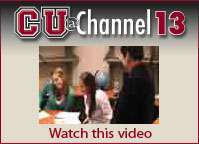
Working out of an office inside łÉČËÍ·Ěő’s Ho Science Center, a group of students is having an impact on a community more than 7,000 miles away – in Uganda, Africa.
The undergraduates are part of a unique venture between łÉČËÍ·Ěő and Conservation Through Public Health (CTPH), an Africa-based nongovernmental organization focused on environmental conservation and public health in a remote region of Uganda.
Since the office at łÉČËÍ·Ěő is CTPH’s only North American location, the students play a critical role, said the organization’s founder Gladys Kalema-Zikusoka.
Kalema-Zikusoka, from Uganda, visited łÉČËÍ·Ěő last week to recognize the efforts.
“We’re very fortunate to have this relationship with łÉČËÍ·Ěő. The students are responsive to our needs. They show a unique interest in helping the people and animals in Uganda, and because of that they’re having a great impact in Africa,” said Kalema-Zikusoka, as she toured the university.
During her visit, she met with Kyla Dzwilewksi ’08, a student who’s been looking over surveys conducted by CTPH in Uganda. Dzwilewski’s analyzing data to determine how best to educate Ugandans about tuberculosis.
“This is a perfect way to have a real world impact. It’s an honor to work with an organization such as CTPH and collaborate with the founder,” said Dzwilewski.
|
Why łÉČËÍ·Ěő?
The partnership grew out of a meeting in 2003 between geography professor Ellen Kraly and Kalema-Zikusoka.
“When Kalema-Zikusoka visited my medical geography class, I witnessed the receptivity of łÉČËÍ·Ěő students to the mission and programs of CTPH. It was a magical moment,” said Kraly.
Kraly was so intrigued by CTPH’s mission that she visited the organization’s main office in the southwest corner of Uganda.
She returned to łÉČËÍ·Ěő with a desire to help the organization. Her vision is paying off as students and faculty build on this global partnership.
Last fall the łÉČËÍ·Ěő environmental studies program contributed funds from a $300,000 Andrew W. Mellon Foundation grant to help set up the CTPH office on campus.
Along with public affairs, grant writing and administrative assistance, students are conducting research specifically for CTPH. Geography students work with Kraly to identify the relationships between human disease and gorilla groups in Uganda.
Meantime, undergraduates are also working with biology professor Frank Frey to test gorilla samples for parasites and markers of infectious disease.
Dzwilewski hopes to take her work one step further by studying in Uganda during her spring semester.
“I’m thrilled with the opportunity to have an impact beyond the classroom. I look forward to observing how my work at łÉČËÍ·Ěő is paying off for those who need assistance the most,” she said.